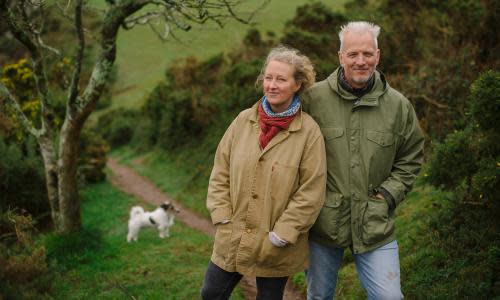The Wild Silence by Raynor Winn review – in search of healing and home

In her bestselling debut, The Salt Path, Raynor Winn walked several hundred miles round England’s South West Coast Path with her husband, Moth, sleeping wild and virtually penniless after their home was lost to bailiffs. Worse, Moth had been diagnosed with corticobasal degeneration, a brain disease for which there was neither cure nor treatment. And yet, as Winn recalls in the opening of this, her second book, as they walked the clifftop paths from Minehead to Polruan, “he’d grown stronger. The fog in his brain had cleared, his movements had become surer, easier to control. Why, why, why had that happened?”
Written as a gift for Moth, a record of their endurance, The Salt Path was shortlisted for the Costa book award and translated into 14 languages. And it caught the eye of Sam, a City trader with a farm beside a creek in Cornwall that is said to have partly inspired The Wind in the Willows. Sam offered Winn and Moth a free tenancy in return for reviving the wildlife on the farm. Their relocation here, once again in search of natural healing but also a sense of home, is the premise of The Wild Silence.
As the book opens, Moth has begun a degree, but in the confines of a converted chapel they are renting near Fowey, and without a physical connection to the land, he is deteriorating. Winn already feels that “a dark sense of enclosure had borne down on me and I had to get out” when she learns that her mother has had a stroke.
Leaving Cornwall for her mother’s bedside, Winn agonises over how she might best allow her to die. Forced to confront mortality wherever she turns, her prose is extraordinary: wise, unflinching, exquisite. As her mother passes away, Winn sees “A mist… Lifting from her body in a gentle, rising haze… It was just there, in the outline of her quiet stillness: a slow movement of molecules through time and air”.
Related: ‘Nature was my safe place’: Raynor Winn on homelessness and setting off on a 630-mile walk
Slipping out of the hospital, she retreats to the nearby woods of her childhood, and to her memories of camping trips, to connect with “the land, the earth, the deep humming background to my very being”. Curiously, it’s here, in her element, where she overreaches: everything Winn sees in nature carries an immutable wonder, wisdom, or elemental power, until occasionally her breathlessness clouds the window: “Moments of blinding lightning lit sheets of water as they were lifted from the ground by the wind and thrown upward to meet the deluge from above in rolling balls of water that reflected the terrifying black monster of a mountain a thousand times, until we became the mountain.”
And… what about the farm? The first half of the book revisits trips to the Lake District, the Peak District, Skye… Not until page 145 do Winn and Moth receive Sam’s invitation to take on his rewilding project. “Time for [Moth] to spend his days on the land and for me to watch and hope.” Here, they once again discover the “sound of connection”, but it’s fleeting: 50 pages later they’re off again, to Iceland, to walk its southern highlands, “in the hope that [Moth] could kick all the fear and pain aside and push his body as he had before”.
Their need for spiritual flight is understandable – backwards, through a life of shared memories; then on to Iceland, to find solace in an environment more primal than Wind in the Willows – but the narrative often lacks a compass. Still, there is a luminous conviction to the prose, and their odyssey through Iceland is profound. As Moth’s condition worsens – he holds up a Mars bar one day to find it embedded with shards of his teeth – Winn appears to surrender something to “a land in transition… a place where the Earth is born and life begins”. Ultimately, she draws hope, and shares it – allowing us to see how the planet’s “fixed impermanence” can make bearable our own.
And the Sun Shines Now: How Hillsborough and the Premier League Changed Britain by Adrian Tempany was shortlisted for the Orwell prize
• The Wild Silence by Raynor Winn is published by Michael Joseph (£14.99). To order a copy, go to guardianbookshop.com. Free UK p&p over £15

